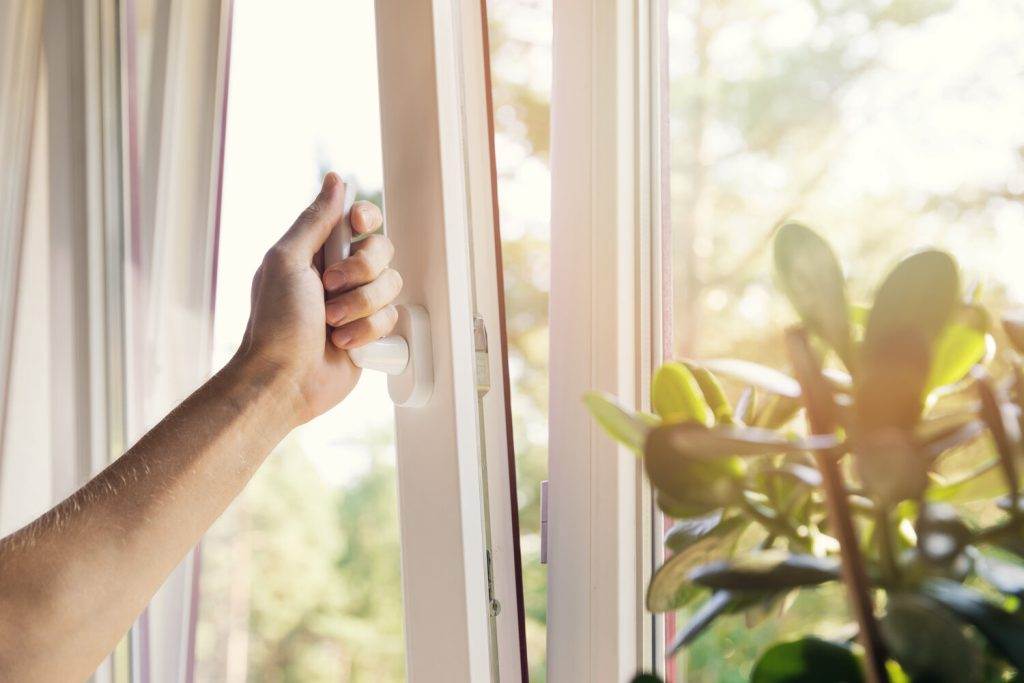Let’s talk about the simple yet powerful act of opening your windows once a day. We’ve all heard about the benefits of letting fresh air into our homes, but is it really necessary? In this article, we’ll explore the science behind this practice and uncover the surprising advantages that come with a daily dose of ventilation. So, grab a cup of coffee, get cozy, and let us uncover the reasons why cracking open your windows might just be the best thing you do for your home and your health.
The Benefits of Opening Your Windows
Improving Air Quality
One of the primary benefits of opening your windows is the improvement in air quality. When we keep our windows closed for extended periods, the air inside our homes can become stagnant and filled with pollutants. Opening windows allows fresh air to enter, carrying away indoor pollutants such as dust, allergens, and volatile organic compounds (VOCs). This fresh air exchange helps to dilute and remove indoor air pollutants, resulting in better air quality for us to breathe.
Reducing Humidity
Another advantage of opening windows is the reduction of humidity levels in our homes. High humidity can lead to mold and mildew growth, which can negatively impact our health. By opening windows, we allow fresh air to circulate and help in drying out moisture. This natural ventilation helps to keep humidity levels in check, creating a more comfortable and healthier living environment.
Removing Odors
Opening windows can also effectively eliminate unpleasant odors from our homes. Whether it’s cooking smells, pet odors, or the lingering scent of cleaning products, fresh air can quickly dissipate these odors. By allowing cross-ventilation to take place, the odorous particles are carried away, leaving our homes smelling fresh and clean.
Providing Natural Light and Fresh Air
Lastly, opening windows provides us with the opportunity to enjoy natural light and fresh air. Natural light has been proven to have various health benefits, including regulating our body’s internal clock and boosting our mood. By letting sunlight in through open windows, we can enhance the ambiance of our homes and make them feel brighter and more inviting. Additionally, fresh air can invigorate our senses, improving our overall well-being and creating a more pleasant living space.
Considerations for Opening Windows
Weather Conditions
While opening windows can be beneficial, it’s essential to consider the weather conditions before doing so. During extreme temperatures, such as hot summers or cold winters, opening windows may result in energy loss and discomfort. However, during mild weather conditions, like spring or fall, opening windows for extended periods can be more manageable and enjoyable.
Noise Pollution
Another consideration when opening windows is the potential for increased noise pollution. If we live in a busy urban area or near a high-traffic road, the noise from outside can be disruptive. It’s important to assess the noise levels before deciding to keep windows open, as excessive noise can interfere with our relaxation and concentration.
Security Concerns
Security is a crucial factor we should always keep in mind when opening windows. Leaving windows open unattended or overnight can leave our homes vulnerable to break-ins or unauthorized access. It’s important to assess our surroundings and consider the security measures in place before deciding to open windows.

This image is property of auntfannies.com.
The Relationship Between Ventilation and Health
Preventing Mold and Mildew Growth
Proper ventilation, achieved by opening windows, plays a significant role in preventing mold and mildew growth. Mold and mildew thrive in moist environments, and without proper ventilation, the excess moisture in our homes can create the ideal conditions for these fungi to flourish. Opening windows allows for the circulation of fresh air, reducing moisture levels and inhibiting mold and mildew growth.
Minimizing Indoor Air Pollution
Indoor air pollution can negatively impact our health, causing respiratory issues, allergies, and other ailments. Opening windows promotes the exchange of indoor and outdoor air, allowing the removal of indoor pollutants and the introduction of fresh, clean air. This exchange helps to minimize indoor air pollution, creating a healthier living space for us.
Boosting Mood and Productivity
Proper ventilation and fresh air have been linked to improved mood and productivity. Stale indoor air can make us feel sluggish and decrease our ability to concentrate. By opening windows and allowing fresh air to circulate, we can experience increased alertness, enhanced mood, and improved cognitive function. This, in turn, can positively impact our overall well-being and productivity levels.
Best Time to Open Windows
Morning
Mornings are an excellent time to open windows for ventilation. This is especially true during the summer months when the temperatures are cooler in the early hours. Opening windows in the morning allows us to bring in fresh air while enjoying the coolness before the day heats up. It’s also a great opportunity to let sunlight in and start the day with a bright and refreshing living space.
Evening
Evenings are another ideal time to open windows. As temperatures begin to drop, opening windows can help cool down our homes and provide much-needed natural ventilation after a warm day. It’s a wonderful way to let in cool evening breezes, creating a comfortable sleeping environment and promoting a restful night’s sleep.
Seasonal Considerations
Seasonal considerations should also influence our decision to open windows. During the spring and fall, when temperatures are mild, it’s easier to open windows for extended periods without discomfort. However, during the hot summer or cold winter months, it may be more practical to limit the duration of window opening to prevent energy loss or discomfort. It’s important to find a balance between energy efficiency and enjoying the benefits of opening windows.

This image is property of static1.squarespace.com.
Potential Drawbacks of Regular Window Opening
Increased Energy Usage
Although opening windows can improve air quality and provide natural ventilation, it can also lead to increased energy usage. In hot summers or cold winters, opening windows for extended periods may require additional heating or cooling to maintain a comfortable indoor temperature. This can result in higher energy bills and increased energy consumption. It’s essential to weigh the benefits against the potential energy drawbacks to find the right balance.
Allergen Exposure
While fresh air can be invigorating, it can also introduce allergens into our homes. Opening windows during times when outdoor allergens are prevalent, such as during high pollen seasons, can increase our exposure to allergens. This may cause discomfort or worsen symptoms for those with allergies or respiratory conditions. It’s important to be aware of the local allergen levels and consider alternative ventilation methods if necessary.
Pest Invasion
Opening windows can inadvertently invite pests into our homes. Insects, such as flies, mosquitoes, or bees, can easily enter through open windows, particularly if window screens are not in place. Additionally, small animals or birds can also find their way inside if windows are left open unattended. It’s crucial to consider the potential for pest invasion and take appropriate precautions when opening windows.
Tips for Effective Window Ventilation
Use Window Screens
To prevent the entry of insects and other pests, it’s advisable to use window screens. These screens act as a barrier, allowing fresh air to enter while keeping unwanted visitors out. Ensuring that window screens are in good condition and properly fitted can enhance the effectiveness and safety of window ventilation.
Strategically Position Fans
In conjunction with open windows, strategically positioning fans can help enhance window ventilation. Placing fans near windows can create a cross-ventilation effect, increasing airflow throughout the room. This can be particularly beneficial when natural breezes are minimal or in areas with high humidity levels.
Monitor Outdoor Air Quality
Before opening windows, it’s important to monitor the outdoor air quality, especially in areas affected by pollution or other environmental factors. Air quality monitoring apps or websites can provide real-time information on pollutant levels, allowing us to make an informed decision on whether to open windows or look for alternative ventilation methods.

This image is property of auntfannies.com.
Alternatives to Opening Windows
Air Purifiers
When opening windows is not feasible or practical, air purifiers can be a suitable alternative. Air purifiers are designed to filter and cleanse the air indoors, removing pollutants, allergens, and odors. They work by utilizing filters, such as HEPA filters, to capture and eliminate airborne particles. Air purifiers can be particularly beneficial for those living in areas with poor outdoor air quality or for individuals with allergies or respiratory conditions.
HVAC Systems
HVAC (Heating, Ventilation, and Air Conditioning) systems provide controlled indoor climate regulation. These systems can help maintain air quality and proper ventilation within our homes without the need for opening windows. HVAC systems can filter and condition the air, ensuring a comfortable and healthy living environment throughout the year.
Indoor Plants
Indoor plants not only add a touch of nature to our homes but also help improve air quality. Plants naturally remove pollutants from the air through a process known as phytoremediation. By introducing indoor plants, we can enhance air quality and promote a healthier living space. However, it’s important to consider the specific maintenance requirements of indoor plants to ensure their effectiveness.
Windows and Energy Efficiency
Windows’ Impact on Heating and Cooling Costs
Windows play a significant role in energy efficiency, particularly in relation to heating and cooling costs. Inefficient or poorly insulated windows can result in energy loss, leading to increased heating or cooling requirements and higher utility bills. Investing in energy-efficient windows with proper insulation can help minimize heat transfer and improve overall energy efficiency.
Optimal Window Insulation
To optimize energy efficiency and prevent energy loss, proper window insulation is crucial. This may include sealing any gaps or cracks around windows, using weatherstripping, or applying window films to improve insulation. By ensuring that windows are properly sealed and insulated, we can reduce energy waste and maintain a comfortable indoor temperature.

This image is property of www.cityclubofrockhill.com.
Considerations for Different Living Environments
Urban Areas
In urban areas, the decision to open windows may be influenced by factors such as noise pollution and air quality. The high levels of noise and pollution commonly found in urban environments can make it challenging to enjoy the benefits of opening windows. In such cases, alternative ventilation methods such as air purifiers or HVAC systems may be more suitable.
Rural Areas
Rural areas typically offer cleaner air and lower noise levels compared to urban areas. Opening windows in rural environments can allow for the enjoyment of fresh country air and a connection to nature. However, it’s still important to consider factors such as allergens, pests, and security before deciding to open windows regularly.
High-Rise Buildings
Living in high-rise buildings presents unique considerations when it comes to opening windows. Depending on the building’s design and location, natural ventilation and air circulation can be limited. In such cases, alternative ventilation methods like air purifiers or HVAC systems may be necessary to maintain good air quality and proper ventilation.
Conclusion
When considering whether to open our windows, it’s important to weigh the pros and cons. Opening windows can bring numerous benefits, such as improved air quality, reduced humidity, and the removal of odors. It provides access to natural light and fresh air, contributing to a more pleasant living space. However, factors like weather conditions, noise pollution, and security concerns should also be taken into account.
The relationship between ventilation and health is significant, as proper ventilation helps prevent mold and mildew growth, minimizes indoor air pollution, and boosts mood and productivity. Determining the best time to open windows, whether in the morning or evening, and considering seasonal variations, can enhance the benefits of window ventilation.
While regular window opening has its advantages, it’s important to be aware of potential drawbacks, such as increased energy usage, allergen exposure, and pest invasion. Implementing tips for effective window ventilation, such as using window screens and strategically positioning fans, can help optimize the benefits while mitigating risks.
In instances where opening windows is not feasible or practical, alternative methods such as air purifiers, HVAC systems, or indoor plants can provide adequate ventilation and improve indoor air quality.
Windows and energy efficiency go hand in hand, with proper insulation and energy-efficient window choices playing a crucial role in reducing heating and cooling costs. Considering the living environment, whether urban, rural, or in high-rise buildings, can also influence the decision to open windows.
Ultimately, the decision to open windows should be based on personal preferences, taking into account the specific circumstances and considerations of each individual’s living environment. Finding a balance between the benefits of opening windows and the potential drawbacks is key to creating a healthy, comfortable, and enjoyable living space.

This image is property of whyy.org.
